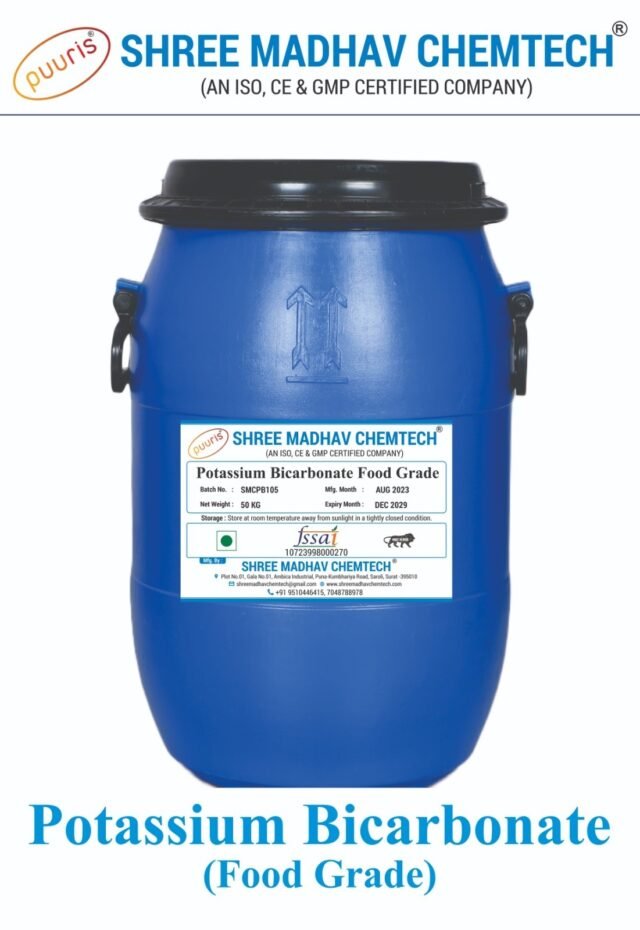POTASSIUM BICARBONATE FOOD GRADE :-
Potassium bicarbonate food grade (KHCO₃) is a white, crystalline powder with a slightly salty taste commonly used as a pH regulator And potassium supplement. Potassium bicarbonate used in wine making process and pH adjustment in food and beverages industry .
It’s also used Nutraceutical & Pakckaged Drinking water Industry.
Pack Size : 5 kg, 25 kg & 50 kg

SHREE MADHAV CHEMTECH is the leading manufacturer of Potassium Bicarbonate (CAS No. 298-14-6) in India. We specialize in producing high quality Potassium Bicarbonate In India.
Our product is used in many of industries including animal feed, food & beverages industry and pharmaceuticals applications.
It is a versatile products with a wide range of industrial applications, making it an essential ingredient in many industrial processes.
Our product is approved by Food Safety and Standards authority of India (FSSAI).
Potassium bicarbonate food grade (KHCO3) is a white Crystalline Powder, odorless, slightly basic and salty substance.
- Fire extinguisher uses :
- Mineral water Plant uses : Added as mineral supplement and to enhance taste of water
- Food and beverages uses : Potassium Bicarbonate is used as leavening agent in baking as food preservative, and an ingredient in food and beverages
- Leavening Agent in Baking Function: Potassium bicarbonate Used as a leavening agent similar to sodium bicarbonate by releasing carbon dioxide gas when it reacts with acid.
- Specific Use of potassium : It is used in low-sodium baking powders and can enhance dough strength and improve cookie texture and mitigate stickiness of products.
- pH Regulator and Buffering Agent Function
- It neutralizes excess acidity, ensuring consistency of products.
- Packaged Drinking Water industry : Enhances water quality by balancing pH value and adding essential minerals widely used by brands like bisleri,Railneer, Kingfisher, and Patanjaliand many more.
- Winemaking industry Function: Potassium bicarbonate is used for deacidification in winemaking, reducing excessive acidity in grape juice to improve taste and balance flavors. Mostly
- Nutritional Supplement • Function: potassium bicarbonate is added to foods and beverages, smoothies, dietary supplements to support health benefits such as Maintaining acid-base balance in the body. • Supporting muscle function, heart health and normal blood pressure. • Reducing the risk of kidney stones and improving bone density by promoting calcium absorption.
- Organic Farming and Food Safety. • Function:Potassium bicarbonate is used as an organic fungicide in agriculture, controlling powdery mildew on crops by inhibiting fungal mycelium development and increasing pH.
- Mineral Supplement in packaged drinking water Potassium is added to packaged drinking water in India primarily Salt as potassium bicarbonate, food-grade mineral additive used to enhance taste, Adjust pH level and increase mineral content in packaged drinking water . potassium bi carbonate additive is approved by the Food Safety and Standards Authority of India (FSSAI) and is a low-sodium alternative to other mineral supplements.

